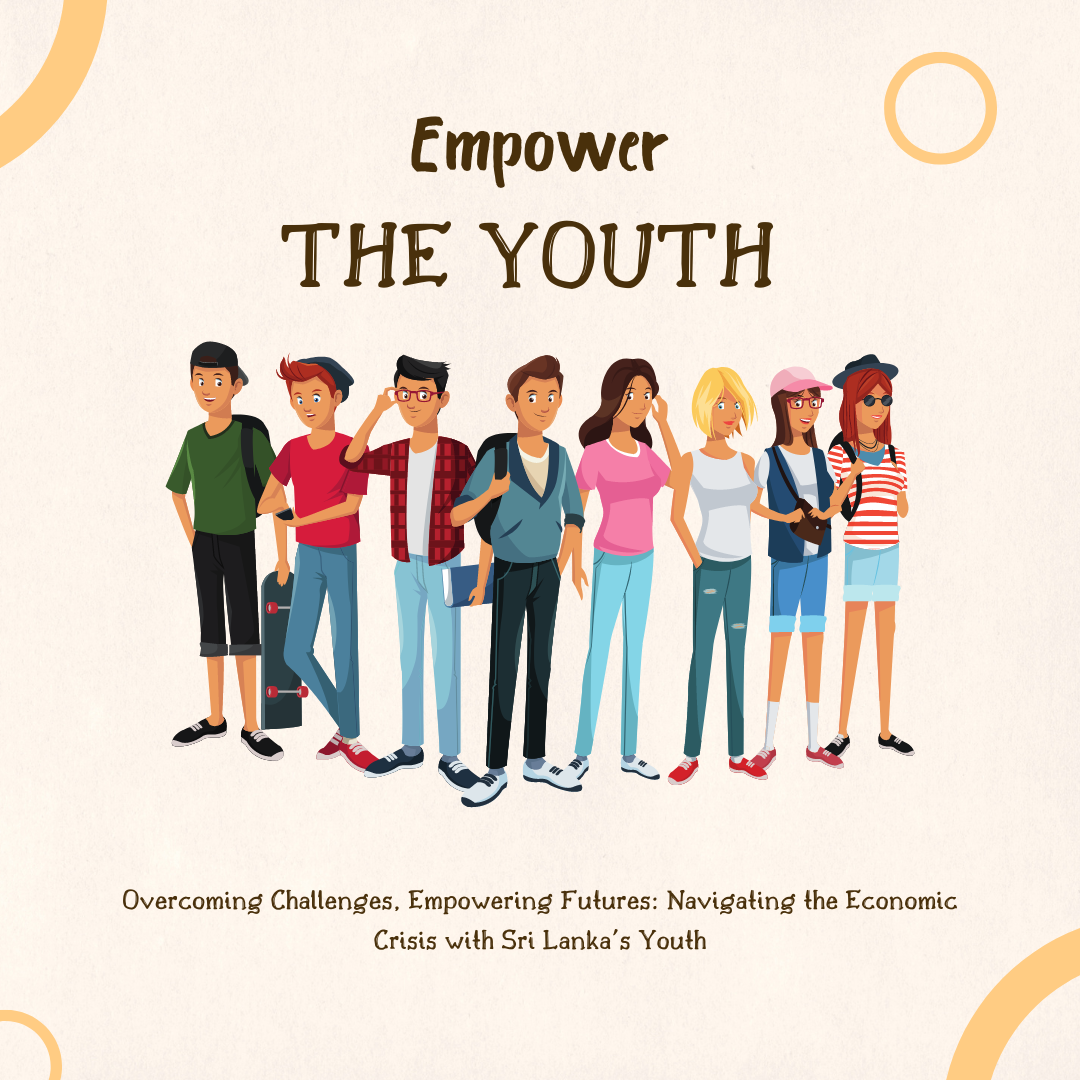Tags:


The post-pandemic economic crisis era has presented numerous challenges for young people in Sri Lanka. The youth in Sri Lanka face several obstacles, including high rates of unemployment and underemployment (Perera, 2020). Moreover, discrimination, stigma, and lack of support further amplify these challenges for LGBTQ individuals and differently-abled youth (Lanka Rainbow Forum, 2020). This blog aims to explore the challenges faced by young people in Sri Lanka during the post-pandemic economic crisis and discuss empowering strategies, including those that cater to LGBTQ individuals and differently-abled youth.
Sri Lankan youth confront significant challenges, such as soaring rates of youth unemployment and underemployment (Perera, 2020). Additionally, limited opportunities for skill-building and education hinder their access to better employment prospects. This disparity is especially pronounced among marginalized groups, including LGBTQ and differently-abled youth, who face discrimination, stigma, and restricted access to education, healthcare, and employment opportunities (Lanka Rainbow Forum, 2020).
To empower Sri Lankan youth, it is crucial to establish mentorship programs that provide guidance and support. Creating safe spaces for marginalized youth to connect with one another and receive support is equally important. Encouraging engagement with youth-led organizations and initiatives can enhance their participation in decision-making processes and improve access to resources. Embracing and celebrating the diversity of Sri Lanka’s youth while fostering a culture of inclusivity and acceptance are key aspects of empowerment.
Efforts should be concentrated on enhancing education and skill-building opportunities for all young people. This can involve providing vocational training, apprenticeships, and supporting higher education programs that prepare them for the workforce. However, it is imperative that these programs are inclusive and accessible, considering the unique needs and experiences of marginalized youth (Perera, 2020).
Greater support for entrepreneurship and innovation, particularly for young people facing additional barriers to employment, is necessary. Encouraging youth to start their own businesses and pursue their ideas should be coupled with readily available resources. These resources can include access to funding, mentorship, networking opportunities, and specialized support tailored to the needs of marginalized youth (Ranasinghe & Kariyawasam, 2021).
Increased investment in infrastructure and technology is required to promote industries that can benefit young people. This entails investing in sectors such as renewable energy and information technology, which can create new job opportunities for skilled young individuals. It is crucial to ensure these industries are inclusive and accessible to all, without perpetuating existing inequalities and barriers (Central Bank of Sri Lanka, 2020).
Enhanced support for healthcare and well-being, particularly for marginalized youth, is of utmost importance. Access to inclusive and non-discriminatory healthcare services, coupled with mental health support, is crucial. Addressing the stigma and discrimination faced by these young individuals and ensuring their access to necessary support and resources are essential for their overall well-being (Lanka Rainbow Forum, 2020).
In conclusion, empowering the youth of Sri Lanka in the post-pandemic economic crisis era is vital for building a more equitable and prosperous future for the country. While all young people face challenges in accessing education, employment, and opportunities, those who identify as LGBTQ or are differently-abled face additional barriers due to discrimination and stigma. To empower all young people, there needs to be a greater focus on education and skill-building, entrepreneurship and innovation, infrastructure and technology, healthcare and support, as well as advocacy and policy change. It is essential to address the unique needs and experiences of marginalized youth and work towards a more inclusive and equitable future for all. By investing in the potential and talent of young people, Sri Lanka can build a brighter future for generations to come.
In conclusion, empowering the youth of Sri Lanka in the post-pandemic economic crisis era is vital for building a more equitable and prosperous future for the country. While all young people face challenges in accessing education, employment, and opportunities, those who identify as LGBTQ or are differently-abled face additional barriers due to discrimination and stigma. To empower all young people, there needs to be a greater focus on education and skill-building, entrepreneurship and innovation, infrastructure and technology, healthcare and support, as well as advocacy and policy change. It is crucial to address the unique needs and experiences of marginalized youth and work towards a more inclusive and equitable future for all. By investing in the potential and talent of young people, Sri Lanka can build a brighter future for generations to come.
Tharushi Imasha Kumarasiri
Feb 17, 2023
0